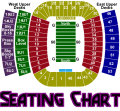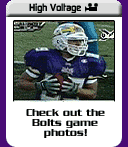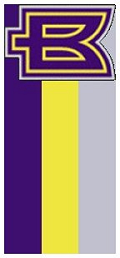"I can't emphasize how important the fans are to the
Thunderbolts and to this league. We love for the people of
Birmingham to come out and see us practice and play. We will
publish where we are going to practice and what time. Our
hope is to start the day at Birmingham Southern College and
then perhaps go around to some different places in the afternoon."
"It's hard to tell because you are evaluating a contact
sport during a non-contact time. I think it's safe to say
that everybody we drafted appears to be a skilled athlete.
I don't think we will really know how good they are until
training camp in Orlando."
"In the first mini-camp we got a lot of our offense taught
and got a good chance to evaluate our players. It was a good
opportunity for our offensive staff to work together since
we had not been together before, so that was productive. "The
players were very attentive, very professional. Their attitude
was that they were on an extended job interview, which in
effect, is what the first mini-camp was."
"There will be no contact, but we will have all our offensive
and defensive linemen in camp so we can have some drills that
we couldn't have before. Having both sides of the ball here
will help us know a little more about the offensive guys than
we know now. We will obviously know a lot more about our defensive
guys since they haven't been in at all. Still, it won't be
until training camp until we really know who the football
players are."
"You want to see who can run, because if you can't run
you can't play defense. You also want to see who can learn,
because you can't line up in the same defense every time in
this league. "Most of the offenses are going to be passing
offenses. In the college game you see the option one week,
the I-back one week and a one-back set the next week. In the
professional ranks it all starts with the pass, although a
lot of people say it starts with the run. To defend the passing
game and the running game, you have to have players who can
run."
"We will try to install about 80-percent again, like
we did with the offense. The other 20-percent comes toward
the end of training camp when you start to game plan toward
your opponent. So when I say 80-percent, I use that term loosely.
It may be a little more except for your game planning."
"We are going to devote 25 minutes a day in this camp
to special teams. Every morning we are going to do 15 minutes
on special teams. In the afternoon we will do more individual
stuff and not as much team stuff on specialty."
"We lost a wide receiver (Eric Chew) during the first
camp, which got us to 69 players. One of our defensive line
draft picks is currently active with a NFL team. We anticipated
going into the Dec. 11 camp with 68 players and we wanted
to replace the defensive lineman first. We will replace the
wide receiver between now and the start of camp, so we will
be back at 70 by then." "Even though on paper it
looked like we were at 69 players, we were actually at 68
because we don't expect Henry Taylor to report because he
will be active with the Falcons."
"In a vertical passing game we will probably end up keeping
five wide receivers and three tight end/H-Back combinations.
We will also keep a wide receiver on our practice squad."
"The vertical passing game means you want to start by
pushing everybody up the field, it doesn't necessarily mean
you will be running up the field every snap. You can have
a vertical passing attack with five wideouts and three tight
end/H-back types."
"The difference in dealing with professional athletes
as opposed to the college guys is night and day. The basics
of the game do not change whether it's high school, college
or pro. The qualities that you need to be good at the game
do not change whether it's high school, college or pro."
"What does change is that you dont really have time
to coach the intangibles like character, conditioning and
intensity. Our approach is that we need those intangibles
to be successful, that every player has to have to them. The
more players we have with those intangibles, the better team
we have. Our team can expect us to evaluate the intangibles,
but they would be disappointed if they expect us to coach
the intangibles. So that is one difference."
"Another difference is the maturity. When you sit down
to have a conversation with a 30-year-old man or a 25-year-old
man, it is a lot different than having that conversation with
an 18-year-old college freshman who has a million different
things going through his head that are not usually highly
organized."
"So the differences between pro and college players are
maturity and the coaching of the intangibles."
|












